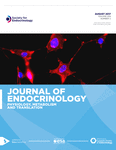Protocatechuic acid exerts a cardioprotective effect in type 1 diabetic rats
- Yoswaris Semaming1,2,
- Sirinart Kumfu1,3,
- Patchareewan Pannangpetch1,2,
- Siriporn C Chattipakorn1,4 and
- Nipon Chattipakorn1,3⇑
- 1Cardiac Electrophysiology Research and Training Center, Faculty of Medicine, Chiang Mai University, Chiang Mai 50200, Thailand
2Department of Pharmacology, Faculty of Medicine, Khon Kaen University, Khon Kaen 40002, Thailand
3Cardiac Electrophysiology Unit, Department of Physiology, Faculty of Medicine
4Department of Oral Biology and Diagnostic Sciences, Faculty of Dentistry, Chiang Mai University, Chiang Mai 50200, Thailand
- Correspondence should be addressed to N Chattipakorn; Email: nchattip{at}gmail.com
Abstract
Oxidative stress has been shown to play an important role in the pathogenesis of diabetes-induced cardiac dysfunction. Protocatechuic acid (PCA) is a phenolic compound, a main metabolite of anthocyanin, which has been reported to display various pharmacological properties. We proposed the hypothesis that PCA exerts cardioprotection in type 1 diabetic (T1DM) rats. T1DM was induced in male Sprague–Dawley rats by a single i.p. injection of 50 mg/kg streptozotocin (STZ) and groups of these animals received the following treatments for 12 weeks: i) oral administration of vehicle, ii) oral administration of PCA at a dose of 50 mg/kg per day, iii) oral administration of PCA at a dose of 100 mg/kg per day, iv) s.c. injection of insulin at a dose of 4 U/kg per day, and v) a combination of PCA, 100 mg/kg per day and insulin, 4 U/kg per day. Metabolic parameters, results from echocardiography, and heart rate variability were monitored every 4 weeks, and the HbA1c, cardiac malondialdehyde (MDA), cardiac mitochondrial function, and cardiac BAX/BCL2 expression were evaluated at the end of treatment. PCA, insulin, and combined drug treatments significantly improved metabolic parameters and cardiac function as shown by increased percentage fractional shortening and percentage left ventricular ejection fraction and decreased low-frequency:high-frequency ratio in T1DM rats. Moreover, all treatments significantly decreased plasma HbA1c and cardiac MDA levels, improved cardiac mitochondrial function, and increased BCL2 expression. Our results demonstrated for the first time, to our knowledge, the efficacy of PCA in improving cardiac function and cardiac autonomic balance, preventing cardiac mitochondrial dysfunction, and increasing anti-apoptotic protein in STZ-induced T1DM rats. Thus, PCA possesses a potential cardioprotective effect and could restore cardiac function when combined with insulin treatment. These findings indicated that supplementation with PCA might be helpful for the prevention and alleviation of cardiovascular complications in T1DM.
- Received in final form 17 July 2014
- Accepted 28 July 2014
- Made available online as an Accepted Preprint 29 July 2014
- © 2014 Society for Endocrinology











